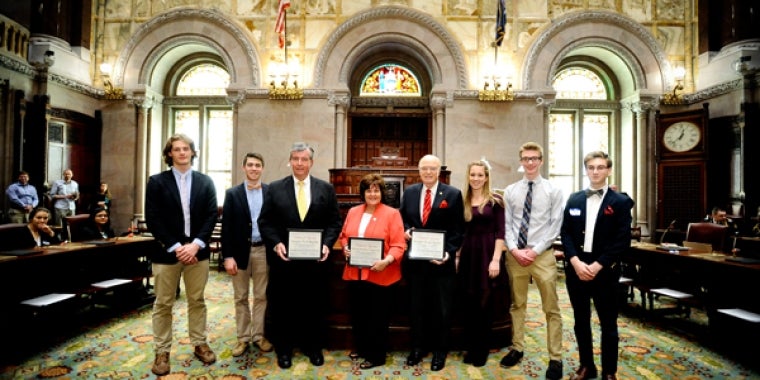
SENATOR FARLEY'S COMMENTS TO THE FULTON COUNTY REGIONAL CHAMBER OF COMMERCE AND INDUSTRY

Turning the State around
The theme of this year’s Session was “turning the State around.” As you are well aware, New York has struggled with economic problems and high taxes.
Furthermore, there has been a lot of turmoil in State government, including the scandalous resignation of Governor Spitzer in 2008 and the difficulties encountered by his successor, Governor Paterson.
New York was hit hard by the nationwide recession, especially given our reliance on revenues generated by Wall Street.
Two of the first challenges for our new Governor were:
1) could he work with the Legislature on a bipartisan basis; and
2) could he pass a budget that addressed a potential $10 billion state budget deficit?
I am pleased to report that both answers were “YES.”
In 2009 -- when the Democrats took control of the Senate -- we saw spending increase by more than $10 billion and taxes increase by some $8 billion, setting the stage for future budget deficits.
This year, the new Governor recognized that the State could not continue with “business as usual.” He partnered with the Senate and we were able to deliver a final budget that cut spending and rejected new tax increases.
These steps are important for trying to reduce the tax burden and improve New York’s ability to compete in the global marketplace.
Property tax cap
Similarly, one of the complaints that I constantly hear from homeowners and business persons is the crushing burden of real property taxes.
We have taken a number of steps to try to address this problem. The STAR program has been very helpful to many families. Also, the Legislature regularly provided significant increases in school aid. Nevertheless, property taxes kept on rising.
Again, the new Governor worked with the Republican Senate to get agreement on a property tax cap.
In general, the local property tax levy will be limited to either 2% or the increase in the Consumer Price Index, whichever is less.
There was broad public support for a property tax cap. Many states already have property tax caps, and it was recognized that rising property taxes have driven many families and businesses out of New York.
Admittedly, the tax cap will present some real challenges and difficulties for local governments and school districts.
Although there is likely to be some short term pain, we need to recognize that controlling property taxes is essential to the future of our State. The current situation is unsustainable, and families and businesses are in desperate need of relief.
Mandate relief
I agree that more can – and must – be done to provide mandate relief to local governments and schools.
Some mandate relief provisions were enacted as part of the tax cap legislation. In addition, the Law also established a Mandate Relief Council that can take administrative action to provide relief.
This will be a priority in next year’s Legislative Session.
Now that the property tax cap is a reality, I believe that it will serve as a catalyst to generate necessary mandate relief.
Tryon
I have been very opposed to the policy shifts made by Gladys Carrion, the Commissioner of the Office of Children and Family Services.
I think the agency’s new policies are dangerous to staff, dangerous to communities, and of questionable value to the young adults who have committed crimes.
However, she has had the strong support of the past 3 governors, the downstate media, downstate legislators and many interest groups.
Unfortunately, we were unable to prevent the closure of several youth facilities, including Tryon.
However, County and local officials have responded with an impressive plan to turn this setback into a positive development by converting the facility into a business park.
I had previously worked with Governor Mario Cuomo to establish the successful Economic Development Zone in Fulton County and attract businesses to your local industrial parks.
Now, one of my top priorities is to work with Governor Andrew Cuomo and local officials to convert Tryon and take other steps to generate jobs and economic growth in Fulton County.
Hudson River-Black River Regulating District
A 2009 federal court decision threw out the 80-year policy under which the Regulating District received most of its funding from hydropower companies.
The District has been pursuing various options to try to reestablish its revenue stream, but these efforts have not yet been successful.
In the meantime, school districts and local governments have been squeezed by the District’s inability to pay its property taxes. Property taxes account for about 45% of the District’s Hudson area expenses.
I’ve worked with Assemblyman Butler to try to keep pressure on the Governor and other state agencies to resolve this problem.
Recently, we worked to ensure that state officials approved the transfer of funds to pay some of the overdue taxes.
However, this was only a temporary solution. We continue to urge steps to reestablish the District’s revenue stream and ensure that local property taxes are paid.
Furthermore, I anticipate that there will be renewed discussion about the future of this public authority, and whether it should be merged into another state agency.
While there might be some benefits, there are also concerns about the potential negative impacts this could have on residents and businesses around the Great Sacandaga Lake. I’d appreciate any thoughts you might have on this matter.
Upcoming issues
Among the major priorities for 2012 will be:
- overseeing the implementation of the property tax cap, and responding as necessary;
- securing additional mandate relief measures;
- advancing economic development initiatives to promote job creation, including implementing the plans dveloped by the “regional economic development councils”;
- maintaining a balanced budget at the state level while continuing to avoid the call by interest groups for new taxes; and
- taking steps to help communities ravaged by the recent floods, as well as taking steps to prevent future flooding.



